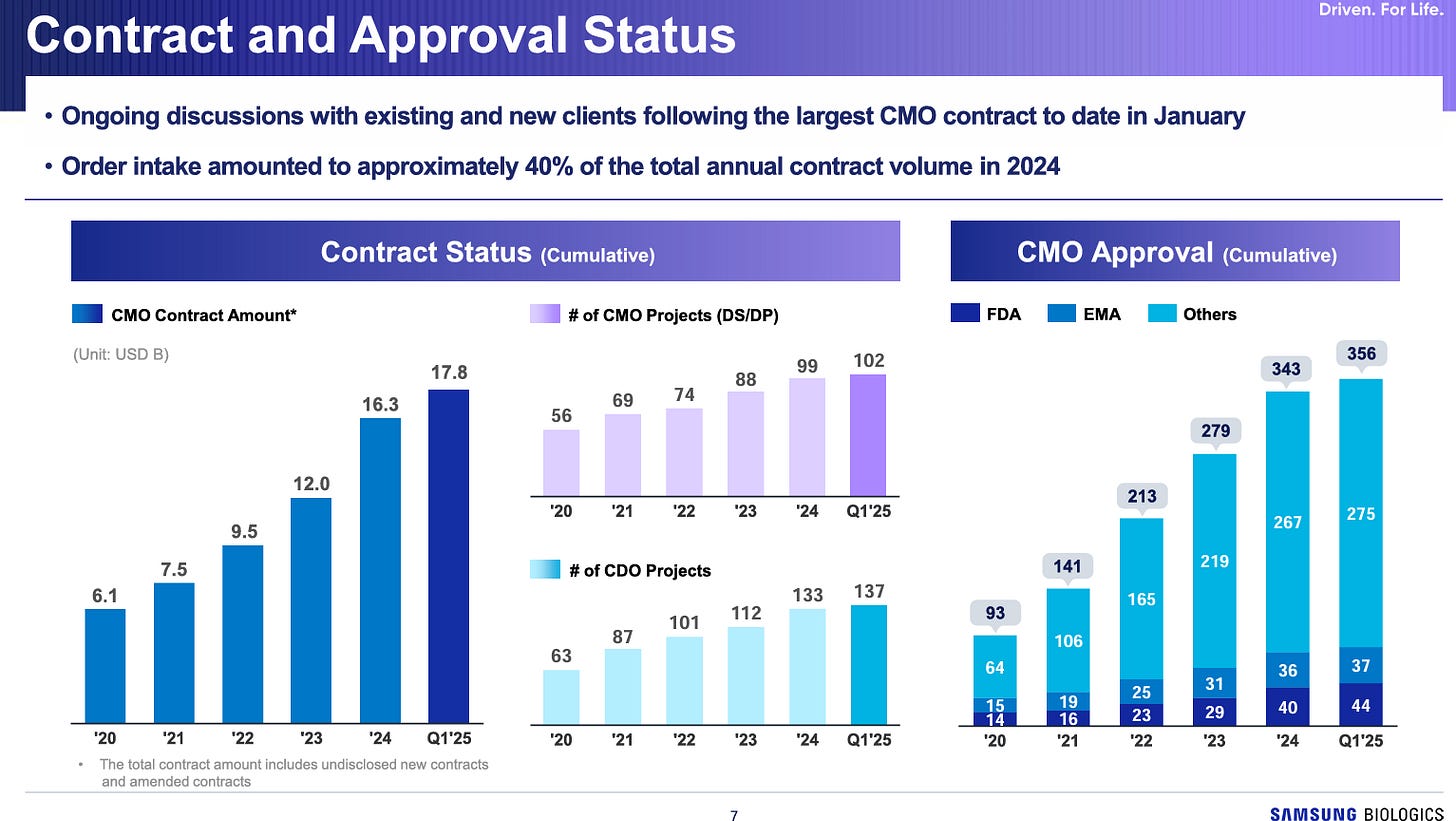On 22 May, Samsung Biologics (207940 KS) announced that that it plans to establish a new holding company called Samsung Bioepis Holdings through a spin-off.
Samsung Bioepis Holdings will fully incorporate Samsung Bioepis as a wholly owned subsidiary. Samsung Bioepis will focus on the biosimilars business. Samsung Biologics will focus on the CDMO business.
There is likely to be mixed reactions to Samsung Biologics' announcement to create a holding company structure to split the CDMO and biosimilar businesses.
There is likely to be mixed reactions to Samsung Biologics' announcement to create a holding company structure to split the CDMO and biosimilar businesses.
Although more than a decade has passed since the merger of Cheil Industries and Samsung Corp to create the current Samsung C&T (028260 KS), some investors still have bad memories of this deal. Therefore, any major big deal involving Samsung Group companies will be heavily scrutinized.
On 22 May, Samsung Biologics (207940 KS) announced that that it plans to establish a new holding company called Samsung Bioepis Holdings through a spin-off. The main purpose of this spin-off is to separate its contract development and manufacturing organization (CDMO) business and biosimilars (biopharmaceutical copies) business.
The spin-off process will proceed with the submission of a securities report on 29 July, followed by a shareholders meeting on 16 September for final approval.
Under this new structure, Samsung Bioepis Holdings plans to fully incorporate Samsung Bioepis as a wholly owned subsidiary. Samsung Bioepis will focus on the biosimilars business. Samsung Biologics will focus on the CDMO business.
Samsung Bioepis was a joint venture founded in 2012 by Samsung Biologics and US company Biogen. Initially, Samsung Biologics had an 85% stake in this JV and Biogen had a 15% stake. In 2022, Samsung Biologics purchased Biogen's 15% stake in this JV, making Samsung Bioepis a 100% subsidiary.
In other words, this basically means that Samsung Bioepis which was incorporated as a 100% subsidiary, will be separated again. According to Samsung Biologics, this separation is likely to significantly reduce the risk associated with blending biosimilars and CDMO businesses amid increasing uncertainties in external policies such as drug price reductions.
According to the company, the split will allow the company to concentrate its resources on its CDMO business, which handles not only the outsourced manufacturing of drug substances but also all of the innovation and development work that occurs prior to production. The company also mentioned that this separation will improve the operational independence of Samsung Biologics and Samsung Epis Holdings.
According to Samsung Biologics, the most important reason why it is conducting this spin-off is to resolve conflicts of interest in CDMO and biosimilar businesses. After the spin-off, Samsung Biologics will only own Samsung Biologics America, and the newly established Samsung Epis Holdings (tentative name) will own Samsung Bioepis and the newly established subsidiary as its 100% subsidiaries.
The new subsidiary under Samsung Epis Holdings plans to engage in new bio-related businesses. The CDMO and biosimilar business entities will be completely separated through the spin-off. In the past several years, there have been repeated concerns about pharmaceutical products made by Samsung Biologics that compete with Samsung Bioepis' customer products resulting in potential conflicts of interests among customers.
Samsung Biologics' CDMO customers are mainly global pharmaceutical companies that develop and possess original new drugs. Samsung Bioepis develops and sells biosimilars that are based on the expiration of patents on original products of these global pharmaceutical companies, resulting in potential competition with Samsung Biologics' CDMO customers.
Stock split-off ratio - The stock split ratio will be 0.65 for Samsung Biologics and 0.35 for Samsung Epis Holdings. The number of issued shares will be 46,299,510 shares for Biologics and 24,883,049 shares for Samsung Epis Holdings. Current shareholders of Samsung Biologics will basically own their respective stakes in Samsung Biologics and Samsung Epis Holdings post stock split-off.
Key dates:
16 September - Company split (vote by shareholders)
1 October - Newco start of operations
29 October - Samsung Epis Holdings listing
No duplicate listings for at least five years - The company has confirmed that there will be no duplicate listings of Epis in the near future to protect shareholder rights. Samsung Epis Holdings will not list its subsidiary Samsung Bioepis on the stock market or domestic or international stock markets for five years from the date of establishment.
Current vs New Shareholding Structure of Samsung Biologics
Source: Company data
Trump's Efforts to Reduce Drug Prices in the United States
On 12 May, U.S. President Donald Trump signed an executive order directing drugmakers to lower the prices of their medicines to align with what other countries pay. Basically, the prescription drug prices in the United States are much higher than in other major countries and Trump wants to change this.
The United States pays the highest prices for prescription drugs, often nearly three times more than other developed nations. This move is likely to be heavily blocked by the pharmaceutical companies and it remains uncertain how effectively it will be enforced.
Samsung Biologics has a global business. Europe accounted for 65.2% of total revenue in 2024, followed by Americas (25.8%), South Korea (3%), and others (6%). Because the United States is one of the largest customer countries for Samsung Biologics, an industry wide decline in drug prices could negatively impact its operations in the U.S.
Samsung Biologics Revenue Breakdown (Source: Smartkarma)
Keep reading with a 7-day free trial
Subscribe to Douglas Research Insights to keep reading this post and get 7 days of free access to the full post archives.






